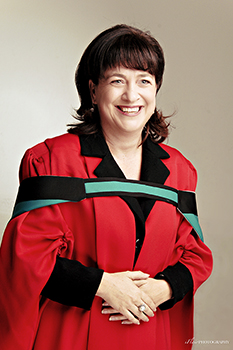Latest News Archive
Please select Category, Year, and then Month to display items
03 October 2018
|
Story UFS
|
Photo Katlego Sekele
 Students engaged authorities and Student Affairs
representatives on sexual and gender-based matters.
Students engaged authorities and Student Affairs
representatives on sexual and gender-based matters.
Do you know enough about the Sexual Harassment, Sexual Misconduct and Sexual Violence policy adopted by the university in June 2018? The Office for Gender and Sexual Equity (GSE) at the University of the Free State (UFS) hosted a dialogue on the role of the institution in matters of sexual and gender-based violence and addressing issues surrounding sexual violations.
Developments such as the countrywide #TotalShutdown: Intersectional Women’s March Against Gender-based Violence last month serve as proof of the dire need for issues surrounding sexual violations to inform policies and active safety measures.
Policy purpose
According to the policy, the objectives are to create a safe and enabling environment, establish a common understanding of what constitutes sexual harassment, sexual misconduct and sexual violence, provide applicable and accurate information, ensure that victims receive the necessary support, clearly outline disciplinary procedures for perpetrators, and clarify institutional accountability.
Student’s take on solutions
Tammy Fray, a member of the Student Representative Council, who formed part of the panel at the discussion, says the policy is not a one-stop-shop solution. “The policy is a guiding document. We have to then use it to inform activist work. We cannot always put the onus on policies and codes of conducts to solve problems. However it is our responsibility within this academic space to come up with solutions that enhance the way the policy works.”
Be informed about the policy
It is important to understand the stipulations of the policy in order to make full use of it. Geraldine Lengau, Officer at the GSE said: “It’s important that students know that the institution is not operating in silos but that their demands have been heard and the institution has acknowledged that there is a need for the policy to be adopted. It also makes the process of reporting better with the assistance of the Sexual Assault Response Team coordinator.”
First Dementia Care Mapper in Africa receives international award
2015-11-17

The first Dementia Care Mapper from Africa,
Dr Sanet du Toit.
Photo: iFlair Photography |
“In one facility, four elders who needed minimal assistance to eat were provided with an opportunity to sit at a separate table, and enjoy their breakfast as preferred – that is, to spread bread with butter, jam or marmite; to add their own milk and sugar to their tea.”
Dr Sanet du Toit described a scenario where staff members at an old-age home implemented recommendations she made following an observation she conducted.
“We do not think twice about doing this but, within institutional care settings, these ’normal’ routines are often replaced with practices that could be viewed as ‘time savers’. For example: everyone gets milky, sweet tea to drink,” she explains.
Yet, by creating an environment where the elderly living with dementia were at liberty to determine the amount of milk in their tea, active participation meant an improved well-being.
She was honoured with the International Association of Homes and Services for the Aging (IAHSA) Award for Excellence in Applied Research on 1 September 2015, at a joint conference held by the Aged & Community Services Australia (ACSA) and IAHSA in Perth.
This exceptional Occupational Therapist from the University of the Free State (UFS) emerged as the first Dementia Mapper from Africa. Dementia Care Mapping is a method used internationally to assess with the purpose of improving the quality of care given to residents in institutionalised settings.
The IAHSA award acknowledged her person-centered care training and research in South African residential care facilities while working at the UFS as a senior lecturer from 2003 to 2013. Currently, she is based at the University of Sydney, but remains an affiliated lecturer at the UFS Department of Occupational Therapy.
In 1992, she graduated with a BA in Occupational Therapy at the UFS, and went on to further her studies at various institutions. Also, she is one of the founding directors of the Eden Alternative South Africa, an advocacy for older persons’ rights within old-age homes. Over the years, Dr du Toit has won numerous awards for her research.